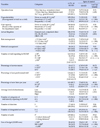Abstract
Purpose
Span of Control defines the scope of the managers' responsibilities to manage nursing staff. This study was done to measure span of control of front-line nurse managers (FLNMs) in Korea hospitals resulting in improvement in their work efficiency.
Methods
A sample of 203 FLNMs from five tertiary hospitals was recruited and completed the questionnaires. Data were analyzed using χ2-test, Fisher's exact test, independent t-test, ANOVA, Scheffé, and Pearson correlation coefficient.
Results
FLNMs had ‘narrow’ (n=8, 4.3%), ‘appropriate’ (n=161, 87.0%), and ‘wide’ (n=16, 8.6%) span of control. Span of control had significant correlations with the number of nurses (r=.63, p<.001), the number of non-nurses (r=.53, p<.001), units (r=.52, p<.001), staff (r=.83, p<.001), and programs (r=.67, p<.001).
Figures and Tables
References
1. Yu M, Kim KS. Influence of decentralization, participation in decision making, job satisfaction on nurse managers' organizational commitment. J Korean Acad Nurs Adm. 2011; 17(3):357–367. DOI: 10.11111/jkana.2011.17.3.357.
2. Meyer RM, O'Brien-Pallas L, Doran D, Streiner D, Ferguson-ParÉ M, Duffield C. Front-line managers as boundary spanners: effects of span and time on nurse supervision satisfaction. J Nurs Manag. 2011; 19(5):611–622. DOI: 10.1111/j.1365-2834.2011.01260.x.
3. Brown P, Fraser K, Wong CA, Muise M, Cummings G. Factors influencing intentions to stay and retention of nurse managers: a systematic review. J Nurs Manag. 2013; 21(3):459–472. DOI: 10.1111/j.1365-2834.2012.01352.x.
4. Ontario Hospital Association. Leading practices for addressing clinical manager span of control in Ontario hospitals [Internet]. Ontario: Ontario Hospital Association;updated February
11, 2013. cited March 26, 2015. Available from: https://aharesourcecenter.wordpress.com/2013/02/11/leading-practices-for-addressing-clinical-manager-span-of-control-in-ontario-hospitals/.
5. Doran D, McCutcheon AS, Evans MG, MacMillan K, McGillis Hall L, Pringle D, et al. Impact of the manager's span of control on leadership and performance. Ottawa: Canadian Health Services Research Foundation;2004.
6. Wong CA, Elliott-Miller P, Laschinger H, Cuddihy M, Meyer RM, Keatings M, et al. Examining the relationships between span of control and manager job and unit performance outcomes. J Nurs Manag. 2015; 23(2):156–168. DOI: 10.1111/jonm.12107.
7. Yom YH, Koh MS, Kim KK, Min S, Shin MJ, Lee MA, et al. Nursing management. 6th ed. Seoul: Soomoonsa;2014.
8. American Nurses Association. Nursing administration: Scope and standards of practice. 2nd ed. Silver Spring, MD: American Nurses Association;2016.
9. Statistics Canada. Study: Work stress among health care providers [Internet]. Ontario: Statistics Canada;2007. cited January 26, 2016. Available from: http://www.statcan.gc.ca/daily-quotidien/071113/dq071113a-eng.htm.
10. Udod SA, Care WD. ‘Walking a tight rope’: An investigation of nurse managers' work stressors and coping experiences. J Res Nurs. 2013; 18(1):67–79. DOI: 10.1177/1744987111434189.
11. Morash R, Brintnell J, Rodger GL. A span of control tool for clinical managers. Nurs Leadersh (Tor Ont). 2005; 18(3):83–93.
12. Jones D, McLaughlin M, Gebbens C, Terhorst L. Utilizing a scope and span of control tool to measure workload and determine supporting resources for nurse managers. J Nurs Adm. 2015; 45(5):234–249. DOI: 10.1097/NNA.0000000000000193.
13. Cheon O. Determinants of span of control in Korean quasi-governmental organizations. Proceedings of 2010 Winter Conference of the Seoul Association of Public Administration. 2010 January 28-29; Seoul: The Seoul Association of Public Administration;2010. p. 87–102.
14. Faul F, Erdfelder E, Lang AG, Buchner A. G*Power 3: A flexible statistical power analysis program for the social, behavioral, and biomedical sciences. Behav Res Methods. 2007; 39(2):175–191. DOI: 10.3758/bf03193146.
15. Laschinger HK, Wong CA, Ritchie J, D'Amour D, Vincent L, Wilk P, et al. A profile of the structure and impact of nursing management in Canadian hospitals. Healthc Q. 2008; 11(2):85–94. DOI: 10.12927/hcq.2008.19596.
16. Kwag WH. Status of hospital nursing in Korea[Internet]. Seoul: Korean Nurses Association;2015. cited February 20, 2017. Available from: http://webzine.koreanurse.or.kr/Webzine2014/file/webzine_259.pdf.
17. Statista. Average age of registered nurses in Canada in 2015, by province [Internet]. 2015. cited February 20, 2017. Available from: https://www.statista.com/statistics/497000/average-age-inregistered-nursing-canada-by-province/.
18. Nam SJ, Yang IS, Kim YA, Shin SJ, Choe HR, Cho YH, Park SA, Yoo HJ, Lee JM, Whang HJ. Survey on working condition of nursing workforce in hospitals (2016). Seoul: Korean Hospital Nurses Association;2016.
19. Udod SA, Care WD. Nurse managers' work stressors and coping experiences: unravelling the evidence. Nurs Leadersh (Tor Ont). 2011; 24(3):57–72.
20. Lee MY, Park MR, Park MM, Lee HJ, Jung EJ, Kim HJ. A survey on hospital nursing staffing (2015). Business report for Hospital Nurses Association. Seoul: Korean Hospital Nurses Association;2016.
21. Meyer RM. Span of management: concept analysis. J Adv Nurs. 2008; 63(1):104–112. DOI: 10.1111/j.1365-2648.2008.04635.x.
22. Brousseau S, Cara CM, Blais R. Experiential meaning of a decent quality of work life for nurse managers in a university hospital. J Hosp Adm. 2016; 5(5):41–52. DOI: 10.5430/jha.v5n5p41.
23. Baker S, Marshburn DM, Crickmore KD, Rose SB, Dutton K, Hudson PC. What do you do? Perceptions of nurse manager responsibilities. Nurs Manage. 2012; 43(12):24–29. quiz 30. DOI: 10.1097/01.numa.0000422890.99334.21.
24. Keys Y. Looking ahead to our next generation of nurse leaders: Generation X Nurse Managers. J Nurs Manag. 2014; 22(1):97–105. DOI: 10.1111/jonm.12198.
25. Rodham K, Bell J. Work stress: an exploratory study of the practices and perceptions of female junior healthcare managers. J Nurs Manag. 2002; 10(1):5–11. DOI: 10.1046/j.0966-0429.2001.00263.x.
26. Cathcart D, Jeska S, Karnas J, Miller SE, Pechacek J, Rheault L. Span of control matters. J Nurs Adm. 2004; 34(9):395–399.
27. Lee H, Cummings GG. Factors influencing job satisfaction of front line nurse managers: a systematic review. J Nurs Manag. 2008; 16(7):768–783. DOI: 10.1111/j.1365-2834.2008.00879.x.
28. Bidilica M, Nedelcu V, Sfetcu R, Ionescu D, Corneci D. Occupational Stress in Romanian Intensive Care Nurses. A Multicentric Study. Manag Health. 2013; 17(4):8–13.
29. Mark BA. The emerging role of the nurse manager. Implications for educational preparation. J Nurs Adm. 1994; 24(1):48–55.
30. Noh W, Lim JY. Nurses' educational needs assessment for financial management education using the nominal group technique. Asian Nurs Res. 2015; 9(2):152–157. DOI: 10.1016/j.anr.2015.04.004.




 PDF
PDF ePub
ePub Citation
Citation Print
Print







 XML Download
XML Download